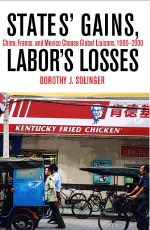Pitfalls and unintended positives of going global

Pitfalls and unintended positives of going global
- October 14, 2009
- New book takes a comparative look at the impact of global trade on the local economies and government responsiveness in China, France and Mexico
-----
 Despite their different economic structures, political party systems and geographic
locations, the countries of China, France and Mexico experienced similar spikes in
local unemployment levels after joining or preparing to join international trade organizations
in the 1980s and 90s. In her new book, States' Gains, Labor's Losses, UCI political
scientist Dorothy Solinger takes a comparative look at the sequence of events that
followed each country's entry into an international trade organization. She draws
a direct link between the nations' decisions to go global and subsequent increases
in local unemployment levels as the governments changed policies to coincide with
the international economy. She goes on to explain how ensuing worker protests generated
variable - and surprising - levels of returns for labor in the three different countries.
Despite their different economic structures, political party systems and geographic
locations, the countries of China, France and Mexico experienced similar spikes in
local unemployment levels after joining or preparing to join international trade organizations
in the 1980s and 90s. In her new book, States' Gains, Labor's Losses, UCI political
scientist Dorothy Solinger takes a comparative look at the sequence of events that
followed each country's entry into an international trade organization. She draws
a direct link between the nations' decisions to go global and subsequent increases
in local unemployment levels as the governments changed policies to coincide with
the international economy. She goes on to explain how ensuing worker protests generated
variable - and surprising - levels of returns for labor in the three different countries.
Why were China, France and Mexico chosen as case studies?
At the start of the 1980s, finding themselves in a crisis of capital shortage as their
customary economic policies clashed with the changed world economy, leaders in each
of these countries suddenly reversed their state's economic developmental model and
strategy to become more involved in the world economy in the hope that heightened
trade and investment would provide needed funds. For China, the choice was to join
the GATT (which later became the World Trade Organization), France deepened its commitment
to the European Economic Community (which became the European Union), and Mexico entered
first the GATT and then the North American Free Trade Agreement. Because this all
occurred at about the same time, it gives us a good comparative picture of the effects
that international trade and the new regulations for engaging intensively in it had
on several critical local economies at the close of the 20th century.
What similarities did you find?
In order to enter into these international organizations and trade agreements, China,
France and Mexico had to follow a lot of new rules about how to run their economies.
While expanding their ability to do business in the global market, the policies reduced
tariff barriers previously in place which meant foreign goods could enter the countries
at cheaper prices, creating more competition and less demand for local goods. The
international agreements also required inflation rates to remain below a certain level
which led to reduced government spending for native firms in the form of tax breaks
and subsidies.
How did this affect the countries' local economies?
Surely the new engagements led to much higher levels of foreign trade and often investment
in the three countries, and to greater availability of cheaper, higher quality goods
from abroad. But the new regulations also put people out of work. For these new entrants
to the world economy, the ability to conduct business internationally was done at
the cost of local peoples' jobs. While this finding isn't necessarily a new concept,
the surprising piece is the way workers and governments reacted in these respective
countries. In the case of China, for instance, where you had a communist, repressive
government, levels of protest were much higher than they had been in the past as foreign
investment and privatizations weakened an already fairly impotent union and workers
became able to organize more freely than before. Chinese leaders got very uneasy in
the face of skyrocketing levels of demonstrations, and, as a result, created three
brand new welfare programs in the hope of fostering social stability.
What happened in France and Mexico?
In Mexico, on the other hand, trade unions - tightly tied to the ruling party - became
even more repressive than they had been historically, and so workers became more quiet,
with the result that no significant new welfare was introduced. French workers were
in the middle, managing to stage a few major, societal-wide street actions. There,
in reaction, the government responded with some new funds.
What lessons can we take away from your new book?
First, that entry into the global economy has its pluses and minuses. The pluses are
most markedly for the country, which becomes a major player. The minuses are, unfortunately,
experienced most heavily by the millions of workers who lose their jobs. Second, protests
can work, even in places as repressive as China, when workers are on their own and
the government is anxious about stability. Connection with the global economy there
gave workers much more freedom than they had previously experienced. And third, interesting
explanations can be framed when comparing quite unlike states, when certain macro
contextual factors are similar.
-----
Would you like to get more involved with the social sciences? Email us at communications@socsci.uci.edu to connect.
Share on:
Related News Items
- Careet RightNotes from a future professor
- Careet RightCan Opportunity Zones ever meet their poverty-fighting promise?
- Careet RightFei Yuan named one of ten global China Times Young Scholar Fellows
- Careet Right'Wired for Words: The Neural Architecture of Language,' an excerpt
- Careet RightEveryone's looking for a partner who has these 3 traits, according to research


